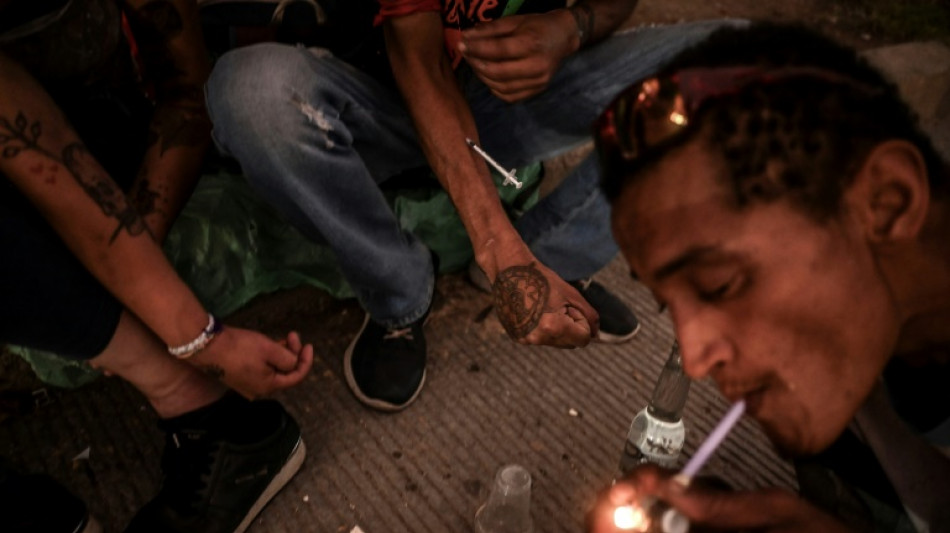
-
 Who is Lisa Cook, the Fed governor Trump seeks to fire?
Who is Lisa Cook, the Fed governor Trump seeks to fire?
-
Masters updates qualifying criteria to add six national opens

-
 New era unlocked: Taylor Swift and Travis Kelce announce engagement
New era unlocked: Taylor Swift and Travis Kelce announce engagement
-
Trump to seek death penalty for murders in US capital
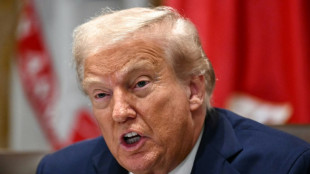
-
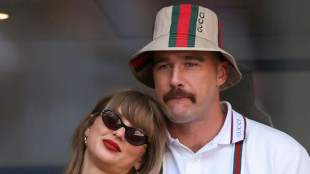 Taylor Swift and Travis Kelce announce engagement
Taylor Swift and Travis Kelce announce engagement
-
Swiatek swats Arango, Sinner launches US Open defence

-
 Swiatek swats Arango to reach US Open second round
Swiatek swats Arango to reach US Open second round
-
Tokyo-bound Duplantis, Lyles headline Diamond League finals

-
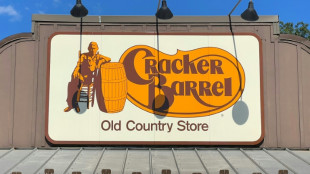 Trump joins backlash against US restaurant Cracker Barrel
Trump joins backlash against US restaurant Cracker Barrel
-
US revokes visa of Brazil justice minister in Bolsonaro row
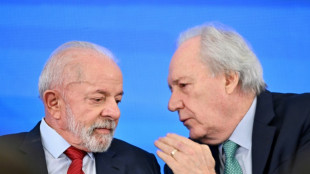
-
 Leverkusen sign former Real Madrid defender Vazquez
Leverkusen sign former Real Madrid defender Vazquez
-
India's Sindhu eyes medal on return to Paris for badminton worlds

-
 British rider Turner wins Vuelta sprint as Gaudu takes race lead
British rider Turner wins Vuelta sprint as Gaudu takes race lead
-
Sci-fi skies: 'Haboob' plunges Phoenix into darkness
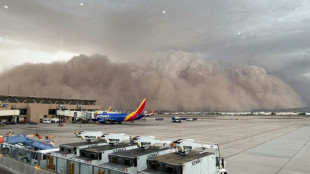
-
 Liverpool face Isak dilemma ahead of Arsenal visit to Anfield
Liverpool face Isak dilemma ahead of Arsenal visit to Anfield
-
French political turmoil sends European stocks sliding
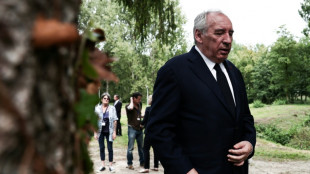
-
 Spain calls wildfires one of its worst disasters in years
Spain calls wildfires one of its worst disasters in years
-
Cadillac choose experienced duo Perez and Bottas for F1 debut
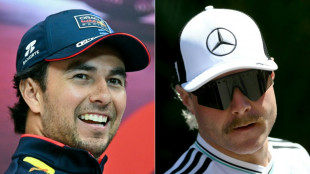
-
 Dortmund sign Chukwuemeka from Chelsea until 2030
Dortmund sign Chukwuemeka from Chelsea until 2030
-
EU claims 'sovereign right' to regulate tech after Trump threat

-
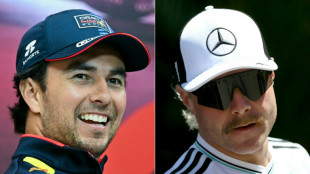 Veterans Perez, Bottas to drive for Cadillac in debut F1 season
Veterans Perez, Bottas to drive for Cadillac in debut F1 season
-
Living in 'sin'? Ronaldo, Rodriguez highlight Saudi double standard

-
 Stocks drop on France turmoil, Trump's Fed firing
Stocks drop on France turmoil, Trump's Fed firing
-
Miyazaki overcomes 'anxiety' to win on badminton worlds debut

-
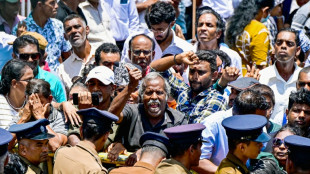 Sri Lanka's jailed ex-president granted bail
Sri Lanka's jailed ex-president granted bail
-
Jennifer Lawrence to get San Sebastian Festival award

-
 The European laws curbing big tech... and irking Trump
The European laws curbing big tech... and irking Trump
-
Germany, Canada to cooperate on key raw materials
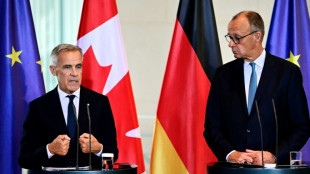
-
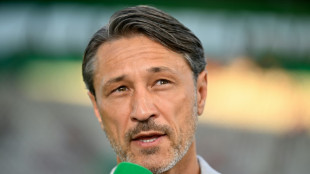 Dortmund extend coach Kovac's contract
Dortmund extend coach Kovac's contract
-
Aid to famine-struck Gaza still 'drop in the ocean': WFP
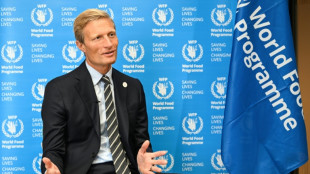
-
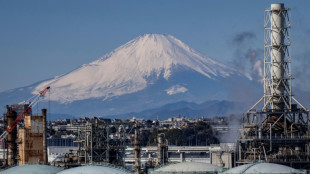 Japanese climber, 102, sets Mount Fuji record
Japanese climber, 102, sets Mount Fuji record
-
Israeli protesters call for hostage deal ahead of cabinet meeting
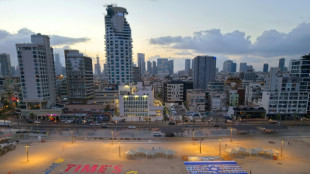
-
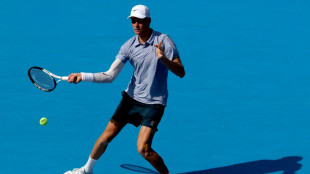 Sinner, Swiatek, Gauff launch US Open title bids
Sinner, Swiatek, Gauff launch US Open title bids
-
US bids to trump China in DR Congo mining rush

-
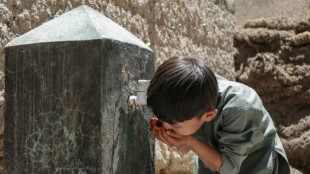 1 in 4 people lack access to safe drinking water: UN
1 in 4 people lack access to safe drinking water: UN
-
A cut above: new-look Alcaraz eases into US Open round two
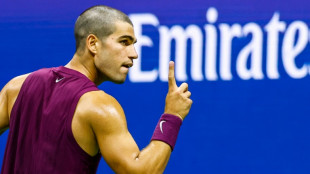
-
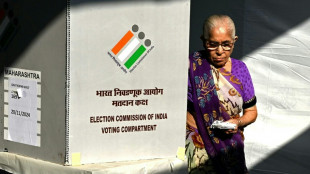 India's Election Commission under fire from opposition
India's Election Commission under fire from opposition
-
Typhoon death toll rises in Vietnam as downed trees hamper rescuers
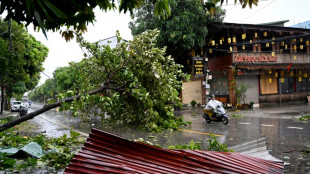
-
 Kneecap cancel US tour, citing UK court hearing in terrorism case
Kneecap cancel US tour, citing UK court hearing in terrorism case
-
Venus Williams bows out of US Open as streamlined Alcaraz sails through

-
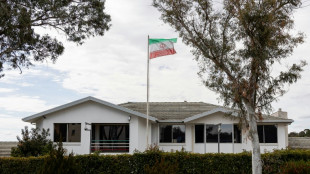 Australia expels Iran ambassador over antisemitic attacks
Australia expels Iran ambassador over antisemitic attacks
-
A cut above: new-look Alcaraz eases past Opelka at US Open
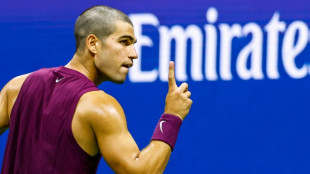
-
 'The marshes are dead': Iraqi buffalo herders wander in search of water
'The marshes are dead': Iraqi buffalo herders wander in search of water
-
New Zealand fast bowler O'Rourke out for three months as injuries mount
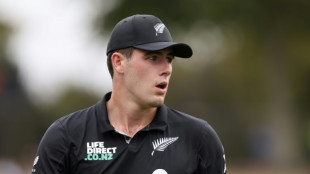
-
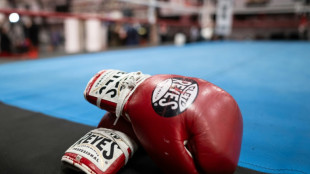 Deaths could spell end for Japanese boxing, says commission chief
Deaths could spell end for Japanese boxing, says commission chief
-
Battling Venus unsure of future plans after US Open exit

-
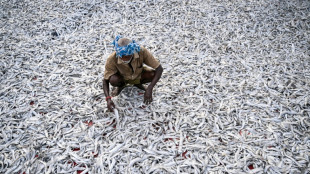 Indian readies for punishing US tariffs
Indian readies for punishing US tariffs
-
Asian stocks down after Trump Fed firing, tariff threats

-
 Venus Williams, Keys bow out of US Open, Alcaraz launches campaign
Venus Williams, Keys bow out of US Open, Alcaraz launches campaign
-
Drones take on Everest's garbage


Three decades after Pablo Escobar's death, drugs ravage Medellin
Three decades after cartel boss Pablo Escobar was shot dead by police on a rooftop in Medellin, the very city he had sought to uplift with drug money is being ravaged by it.
Junkies frequent hundreds of sales points dotted around Colombia's second city, which has become the epicenter of the domestic drug trade.
"Easy access? Yes, absolutely. In Medellin you can find it anywhere. Even on the floor you find drugs," Manue Morales, an out-of-work engineer and chronic user of "basuco" -- the cheapest drug on the market -- told AFP.
Basuco is derived from the coca leaf also used to make cocaine, and mixed with other low-grade substances.
His hands shaking, 32-year-old Morales inhaled a dose in a public park, using a pipe fashioned from a PVC tube, even as pedestrians and police milled around.
"I am a bit nervous," he confessed.
"The truth is that one is less cautious and it (the basuco) can cause you to do stupid things," said Morales, who lost his job due to drug use.
Four brief months later, all his worldly belongings fit into a worn briefcase, and he often sleeps rough.
Morales's downfall, he said, started at a so-called "vice plaza" -- drug vending points that numbered about 160 in Medellin ten years ago, according to police.
Researchers estimate the figure is now closer to 800.
- 'Billion-dollar industry' -
In 2013, some 3.5 percent of Colombians said they had ever taken an illegal substance, according to the state statistics agency.
By 2019, the number had almost tripled to 9.7 percent.
With aid from the United States, leader in the global "war on drugs", a Colombian crackdown since the early 2000s has forced traffickers to look homeward.
"A concentration of product was generated... that could not be exported due to this strong anti-drug policy," said toxicologist Juan Carlos Sanchez.
Domestic clients, however, are not getting the best of what the world's largest cocaine exporter has to offer.
Instead, they are getting hooked on cheaper, low-quality and often dangerous drugs.
With 2.2 million inhabitants, Medellin is today the city with the highest drug consumption -- 15.5 percent -- in Colombia.
The Medellin city council estimates that each drug "plaza" can make up to $75,000 a month -- the equivalent of some 300 minimum salary earners.
But authorities say the increase in domestic drug use has gone hand-in-hand with rising insecurity.
Since 2018, more than 2,500 people have been killed in gang wars nationally, police general Herman Bustamante told AFP.
Official data does not distinguish between gangster and civilian deaths.
- 'Mafia peace' -
In Medellin, the numbers reveal a paradox.
In 1992, at the height of the search for Escobar, the city's homicide rate was 350 per 100,000. Last year it was down to 15.5, even as drug use has surged.
According to Luis Fernando Quijano of social development NGO Corpades, this was more telling of a "mafia peace" than of any real progress.
There were "pacts," he said, between narco gangs and some local authorities to allow drug trade in exchange for relative security in their areas.
"When seizures are made... it is often not the product of (police) intelligence," Quijano added. "They are delivered (by the narcos) to create the image that... the security strategy is working."
Bustamante conceded that some police have been arrested for colluding with traffickers, without giving numbers.
"As long as there are consumers... criminals will see a business opportunity," he said.
- 'The Bronx' -
In 2018, then Medellin mayor Federico Gutierrez accompanied nearly 1,000 police who bulldozed the city's main drug market, known as "The Bronx."
Gutierrez, the right-wing candidate in presidential elections later this month, has vowed a harsher police clampdown on domestic drug trafficking.
His leftist rival Gustavo Petro wants to address drug use as a public health problem.
Since 2021, the government has demolished at least 129 vending spots countrywide.
But many quickly return, including The Bronx.
Twenty-four hours a day, vendors call out the names of their wares: "blones" (marijuana joints), "rocks" (cocaine), ecstasy or "wheels" as they call Clonazepam pills, a psychiatric medicine with sedative effects.
Others offer "tusibi" -- calling it "tusi" for short or sometimes "pink cocaine" -- the latest party drug based on Ketamine mixed with substances such as ecstasy and mescaline, a psychedelic derived from a cactus.
Though "banned" from street sale -- considered too harmful even by the gangs -- those who want it can also find heroin, at about $2.5 per gram.
Addict Julian, his discolored skin stretching over the pronounced cheekbones of his emaciated face, told AFP he needed to inject himself four times a day.
As night fell, Julian -- who did not want to give his full name -- met his supplier in a park thronging with people.
The transaction takes mere seconds.
"Before, you did not see people injecting themselves in the street, discarding syringes," said Julian. "We were few."
But no longer.
M.Odermatt--BTB
